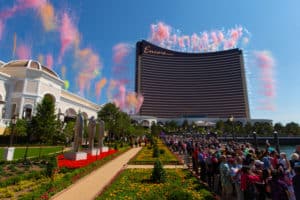
Wynn Resorts’ grand opening in 2019 presaged years of development on the Mystic River in Everett. Photo courtesy of Wynn Resorts | Michael Blanchard Photography
Massachusetts bet big on casino gambling, and not just to bring loads of new tax revenue into the state’s ever-ravenous coffers.
The legalization of Las Vegas-style gambling and the licensing of three major gambling operations was also supposed to provide a major economic development boost to their so-called “host communities.”
But roughly a half decade since resort casinos opened at opposite ends of the state, in downtown Springfield and on the Everett waterfront, their record has been mixed when it comes to serving as catalysts for development and growth.
Everett and Springfield have faced similar challenges with the decline of traditional manufacturing industries, forcing these and other old factory towns onto the long and rocky path of reinvention.
Yet while Everett is undergoing a development boom, Springfield has not seen the same results from the nearly $1 billion casino built there, raising questions about how much of an economic development driver casino gambling has truly been.
An Epic Gamble
It is was an outcome that was hardly preordained.
When Wynn Resorts emerged with a proposal to build a glitzy resort casino in Everett – on the banks of the turgid Mystic River on some of the most polluted land in the region, no less – it looked like an epic gamble. For the first few years, it wasn’t clear that Wynn’s big bet would pay off.
There was a scandal involving the acquisition of the land – a couple of dubious local characters had purchased pieces of the site and were initially slated to receive a big payday.
Wynn then had to square off against the politically connected owners of Suffolk Downs in a high-stakes competition for a license to build and operate a resort casino in the Boston area, eventually winning the nod from the Massachusetts Gaming Commission in 2014.
Then came a state environmental review process from hell, with opponents of the project keeping it tangled up in red tape for another two years until the summer of 2016.
Boston officials went to court in an unsuccessful bid to force Wynn to pay more than the relatively modest mitigation package it had pledged for the city, given that the Encore Boston Harbor casino is just over the city line in Everett.
But then the tide began to turn for Wynn, which finally opened its $2.6 billion casino on 35 acres of reclaimed waterfront land in June 2019.
The casino opened to rave reviews, featuring 3 million square feet of slot machines, table games, restaurants, night clubs, a 671-room luxury hotel and a 2,800-car parking garage.

Downtown Springfield has not seen the revitalization promised by MGM Springfield’s arrival. iStock photo
Disappointing Revenue Numbers
As of February, Massachusetts has raked in more than $1.6 billion in casino taxes, the biggest share coming from Encore Boston Harbor.
Wynn Resorts is now eyeing plans to build a major new development on 13 acres it owns across the street from its Everett casino, including a 1,000-seat entertainment venue, more restaurants, and possibly more hotels down the line.
By contrast, Springfield seemed poised to make a major leap forward when MGM was awarded a license by the state gaming commission in 2017. City officials had been working for years on redevelopment plans for Springfield’s struggling downtown, with the city’s South End having been devasted by a freak tornado.
Unlike Wynn with its Everett project, the permitting process for the MGM casino was relatively smooth, with the new gambling palace opening in 2017 – two years before Wynn was able to finally cut the ribbon its resort casino at the other end of the state.
Yet MGM never managed to hit its revenue goals, with disappointing numbers from its gaming operations the constant theme after an initially rosy first month or two.
Springfield officials also grew disillusioned, feeling that MGM wasn’t holding up its end of the bargain when it came to hitting employment targets; MGM execs soured on the casino as it failed to produce the kinds of returns they had hoped for.
By March, word broke in the business press that MGM was looking to sell its Springfield location.
Location, Location, Location
So why did Wynn’s seeming long shot bet on an Everett casino pay off big-time while MGM’s grand hopes to turn Springfield into a casino resort mecca ingloriously fizzled?
Some of it may have to do with that old real estate adage – location, location, location.
The Everett waterfront may not have looked terribly promising a decade ago, but it was close to Boston, which was at the time was in the middle of an epic economic and development boom.
At the other end of the state in Western Massachusetts, which is still struggling to reinvent its economy in the post-industrial world, Springfield may just have been too far from the action.

Scott Van Voorhis
Having built its reputation through the development of lavish resorts, Wynn may also have had more at stake when it came to the Boston area casino, with its only other holdings in Las Vegas and Macau.
By contrast, MGM, which, while a fine casino company, also has big gambling complexes in Detroit, Atlantic City and Maryland.
File under: A tale of two casinos.
Scott Van Voorhis is Banker & Tradesman’s columnist; opinions expressed are his own. He may be reached at sbvanvoorhis@hotmail.com.




